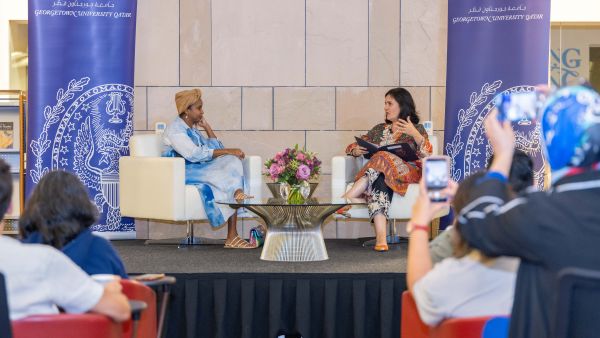A 70-Year-Old Wrongful Execution and One Provocative Question: How Is He NOT a Victim?

The room at Georgetown University in Qatar hummed with anticipation as Booker Prize–shortlisted author Nadifa Mohamed revealed how writers make history matter. Her topic: A man executed for a crime he did not commit. But she didn’t lean into the inhumanity of the events, she instead focused on the human, asking: “How is he not a victim?”
Over the next 90 minutes, Nadifa Mohamed demonstrated something powerful: how to reclaim history not as a distant observer, but as a cultural insider who understands the world that shaped her subject's life.
Rewriting the Narrative
Mohamed's quest to understand the true Mahmood Hussein Mattan, a Somali merchant seaman wrongfully executed in 1952, began with a news story on the overturning of his conviction nearly 50 years too late. Her first breakthrough, however, came when she discussed the falsified evidence and racial prejudice of the day with her father. “I knew Mahmood,” he said. That conversation on the life of Somali seamen led to her first book based on her father’s life story, called Black Mamba Boy. But she couldn’t let go of her fascination with Mattan.
She eventually got access to the court archives, poring over police records and ship logs from 1950s Cardiff, but still couldn’t get beyond a recounting of the sequence of events. So she did what great scholars do: she asked better questions. "My challenge to myself was why did it happen? What does Mahmoud do? Where does his agency lie in all of this?”
By refusing to accept the historical record's silences, Mohamed uncovered the humor, pride, faith, and humanity that archives had erased. She traveled to Cardiff's Tiger Bay neighborhood, interviewed elderly Somali sailors, and pieced together a portrait of dignity in the face of injustice. The result was The Fortune Men—a novel that doesn't just tell you what happened, but makes you feel what it meant.
During her conversation with GU-Q Writer-in-Residence Kamila Shamsie, the latest installment in the university’s acclaimed Qalam series, Mohamed demonstrated that excellent writing isn't separate from rigorous scholarship—it's scholarship at its most powerful. By explaining how she told Mattan's story as a cultural insider who shares his Somali heritage, Mohamed delivered a masterclass on the kind of thinking Georgetown students are challenged to do every day—to ask hard questions, dissect official narratives, and discover truths hidden in plain sight.
Background Information
Georgetown University in Qatar
Established in 1789 in Washington, DC, Georgetown University is one of the world’s leading academic and research institutions. Georgetown University in Qatar (GU-Q), founded in 2005 in partnership with Qatar Foundation, seeks to build upon the world-class reputation of the university through education, research, and service. Inspired by the university’s mission of promoting intellectual, ethical, and spiritual understanding, GU-Q aims to advance knowledge and provide students and the community with a holistic educational experience that produces global citizens committed to the service of humankind.
Located in Doha’s Education City, GU-Q offers the same internationally recognized Bachelor of Science in Foreign Service degree as Georgetown’s Capitol Campus in Washington, DC. This unique, interdisciplinary program prepares students to tackle the most important and pressing global issues by helping them develop critical thinking, analytic, and communication skills within an international context. GU-Q alumni work in leading local and international organizations across industries ranging from finance to energy, education, and media. The Qatar campus also serves as a residency and delivery location for the Executive Master’s in Emergency and Disaster Management along with the Executive Master’s in Leadership.






